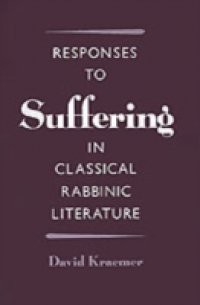The existence of suffering poses an obvious problem for the monotheistic religions. Why does an all-powerful, benevolent God allow humans to suffer? And given that God does, what is the appropriate human response? In modern times Jewish theologians in particular, faced with the enormity of the Holocaust, have struggled to come to grips with these issues. In Responses to Suffering, David Kraemer offers the first comprehensive history of teachings related to suffering in classical rabbinic literature. Beginning with the Mishnah (c. 200 CE), Kraemer examines traditions on suffering, divine justice, national catastrophe, and the like, in all major rabbinic works of late antiquity. Bringing to bear recent methods in the history of religions, literary criticism, canonical criticism, and the sociology of religion, Kraemer offers a rich analysis of the development of attitudes that are central to and remain contemporary concerns of any religious society.



















